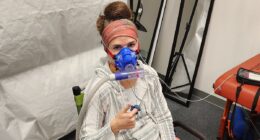Contrary to popular belief, dementia is not a specific disease but a term for a cluster of symptoms linked to cognitive decline.
Dr Jaleel Mohammed, consultant psychiatrist, has taken to his TikTok channel to outline the most common types of the mind-robbing disease.
Speaking on the channel, he said: “Dementia isn’t technically a disease in itself. It’s a syndrome of symptoms like memory loss, loss of language, and loss of other mental functions, which are caused by an underlying disease process.”
He shared that the four most common underlying causes are Alzheimer’s disease, Vascular dementia, Frontotemporal dementia and Lewy body dementia.
1. Alzheimer’s disease
Considered the most common type of dementia, Alzheimer’s disease is responsible for around 60 to 70 percent of all dementia cases, according to the expert.
Dr Mohammed said: “There are clumps of a different type of protein which build up in the brain and damage the brain tissue.
“One of the most common symptoms of early Alzheimer’s disease is short-term memory loss, so that’s forgetting things that have happened recently.”
2. Vascular dementia
This type of dementia occurs when the blood flow to some parts of your brain gets interrupted because of damage to your blood vessels.
The doctor said: “A lack of blood flow leads to damage to underlying brain tissue. In vascular dementia, we can often see problems with problem solving and thinking speed.”
3. Frontotemporal dementia
Frontotemporal dementia affects the front and sides of your brain – the frontal lobes and temporal lobes.
Dr Mohammed said: “This type of dementia can lead to significant changes in personality and very serious language problems because these are the parts of the brain that deal with personality and language.”
4. Lewy body dementia
Similarly to what happens in Parkinson’s disease, Lewy body dementia is triggered by a build-up of clumps of protein called Lewy bodies which damage the brain tissue.
“Lewy body dementia can be associated with hallucinations as well as other symptoms of dementia,” the doctor said.
The NHS recommends speaking to a GP “sooner rather than later” if you’re worried about memory problems or other symptoms.










